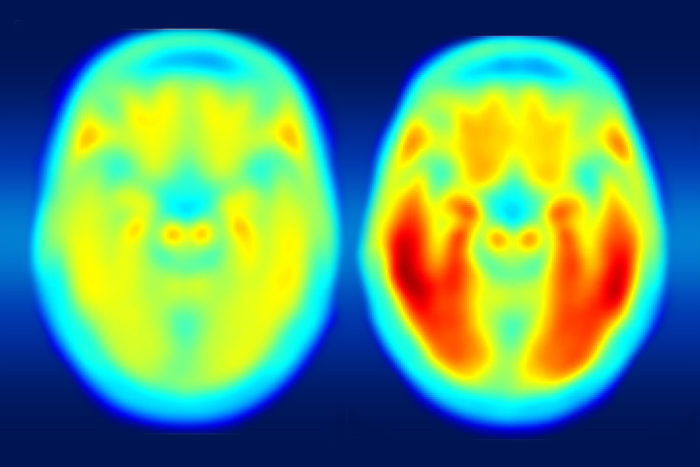
Washington University School of Medicine in St. Louis will collaborate with the pharmaceutical companies AbbVie, Biogen, and Eli Lilly & Co. to investigate the buildup and clearance of tau protein in the brains of patients with Alzheimer’s disease.
Tau is abundant in the brain’s nerve cells, where it stabilizes the scaffold-like microtubules that play a critical role in transporting cargo within cells. But in Alzheimer’s disease as well as other “tauopathies,” such as progressive supranuclear palsy and frontotemporal dementia, clumps of tau protein are abnormally deposited in nerve cells in tangles. However, it remains unclear how tau clumps relate to the memory loss and cognitive decline seen in patients with Alzheimer’s, or how they correspond to the brain’s accumulation of amyloid beta, another hallmark of the disease.
The newly formed collaboration, called the tau SILK Consortium, will take advantage of a technique developed by Washington University colleagues Randall Bateman, MD, Chihiro Sato and Nico Barthelemy to monitor alterations in the rate at which tau is produced, released and cleared from the brain and its surrounding fluid in patients with Alzheimer’s disease.
The technique, called SILK (for Stable Isotope Labeling Kinetics) has been used to measure levels of amyloid beta production and clearance in spinal fluid. Such research has revealed that patients with Alzheimer’s have altered production and clearance of amyloid beta decades before symptoms of the disease become apparent.
“We will determine if and how rates of tau production and clearance are altered in Alzheimer’s disease, which will provide essential information on how to design trials for Alzheimer’s disease and assist in the development of potential treatments that target tau,” said Bateman, the principle investigator of the tau SILK Consortium.
As part of the collaboration, Washington University, AbbVie, Biogen and Eli Lilly & Co. will conduct a study that uses imaging tracers that can bind to tau tangles in the brain. The researchers want to learn whether the abnormal tau aggregation in Alzheimer’s disease is the result of increased tau production or decreased tau clearance, or a combination of both.
They also will investigate whether a specific form of tau is more likely to accumulate than other forms. The ultimate goal is to better understand tau kinetics, a line of investigation that can inspire development of potential therapies for treating Alzheimer’s disease and other tauopathies.
The tau SILK Consortium is coordinated by the Hope Center for Neurological Disorders at Washington University. For scientific inquiries, please contact Anneliese Schaefer at 314-747-3429 or by email, amschaefer@wustl.edu.
Comments and respectful dialogue are encouraged, but content will be moderated. Please, no personal attacks, obscenity or profanity, selling of commercial products, or endorsements of political candidates or positions. We reserve the right to remove any inappropriate comments. We also cannot address individual medical concerns or provide medical advice in this forum.